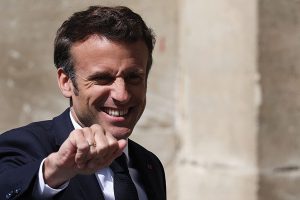Bloomberg
Emmanuel Macron is closer to winning another term at the helm of Europe’s second-largest economy as nationalist leader Marine Le Pen runs out of time to narrow the gap between them before the presidential runoff ballot.
Both candidates are holding their last rallies in areas where they came out on top in the first round two weeks ago — Le Pen chose the northern Hauts-de-France region. Macron is in the southern town of Figeac.
In an interview with France Inter radio, Macron pledged “to try to find a path where we rediscover together the reasons that make us live as a united nation.†He said he hasn’t succeeded “in giving the prospect of progress and security to the French middle and working classes.â€
The gap between the two of them has widened since April 10 to around 11 percentage points, according to a polling average on April 22, as Le Pen’s weaknesses on the economy became more apparent and politicians on the left and right rallied around Macron. He is also benefiting from his stature of experienced statesman amid Russia’s war with Ukraine.
Le Pen needed to land a major blow in the presidential debate to catch up, but failed to do so. The much-hyped head-to-head was ultimately uneventful and didn’t appear to help either candidate win over new voters, or cost them many. A snap survey published afterward suggested viewers found Macron somewhat more convincing. Markets were reassured.
Yet their different world views came into sharp focus, especially on Europe. Le Pen says she wants to transform the European Union into an alliance of nations.
Macron said her ties to Russia and other Euroskeptics would wreck the bloc from within. He wants to continue to strengthen the EU by enhancing unity on issues from health to defense.
European leaders are following the election closely, and with concern. German Chancellor Olaf Scholz, Spanish Prime Minister Pedro Sanchez and Portuguese Prime Minister Antonio Costa called on voters not to back Le Pen while stopping of explicitly endorsing Macron, in a joint column published in several newspapers.
The choice is between the incumbent who values “democracy, sovereignty, freedom and the rule of law†and a nationalist who sides with autocratic rulers like Vladimir Putin who has awakened “memories of Europe’s darkest times,†they said.
Macron is leading Le Pen 56.2% to 43.8%, according to a polling average calculated by Bloomberg on April 21. That would give him a narrower margin of victory than five years ago. But if Le Pen gets more than 40% of the vote, she’d likely emerge empowered while he might have a harder time implementing his reform agenda, depending on how parliamentary elections turn out in June.
During a stop in Roye, Somme, Le Pen returned to her the bread and butter issues that have been her focus throughout the campaign, posing for photos and signing posters with truck drivers. She said she wants to be the president of people who “struggle,†and called on voters to cast ballots with their “reason†and “hearts.â€
The president was in the country’s most diverse department, Seine-Saint-Denis, near Paris, in a clear attempt to court French “beavers†— the left-leaning voters who have been building “dams†to prevent the far-right from taking power.
“It’s not over yet,†Macron said, calling on all his supporters to try to convince as many people as possible to back him. “We shouldn’t get used to the advance of far-right ideas.â€
Green leader Yannick Jadot urged voters to back Macron “with no pleasure, but no hesitation†— in a sign that an informal cross party alliance against the far-right isn’t
entirely crumbling despite Macron’s unpopularity among many on the left. Far-left leader Jean-Luc Melenchon, while not explicitly endorsing the president, has said no one should give “a single vote†to Le Pen.
 The Gulf Time Newspaper One of the finest business newspapers in the UAE brought to you by our professional writers and editors.
The Gulf Time Newspaper One of the finest business newspapers in the UAE brought to you by our professional writers and editors.
